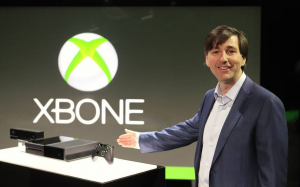OpEd: Gettin’ Down on the XBone
(Editor’s note: Microsoft reversed its position on DRM today. See their press release at http://news.xbox.com/2013/06/update – Please see the comments section below!)
(Editor’s next update: Microsoft has now confirmed that the Xbox One does NOT require the Kinect in order for the console to perform.)
So, Microsoft pretty much XBoned their presentation of the Xbox One so far. They seem to have thought it was a good idea to make a console that was the collection of the least popular features they could design all in one go. They made their kitchy Kinect the primary feature and scared the hell out of everyone by letting people believe the machine was going to be watching them sleep. This, along with restricting used games, needing a network connection to play, and an amazing array of games featuring craggy brown-haired white guys (not exactly a diverse palate) seemingly lost them the hype war at E3. Here are my impressions of the new console so far:
Appearance & Controllers
I’m not sure who is going to make their purchasing decision based on what their console looks like, but whatever. I guess it’s black, and kind of shiny, and looks pretty much like every non-Nintendo console put out in the last 15 years. It probably won’t be the size of a coffee table. The controllers, as far as I can tell, are pretty much identical to the 360 controllers. They have better vibrating . . .thingies . . . so now you’ll be able to get a specific direction from the shimmy-shake, instead of just getting startled and almost dropping the controller.
Kinect
This is where things start to get sticky. The Xbox One one ships with a next-gen Kinect included. As of today, the details from Microsoft suggest you cannot physically disconnect the Kinect or the console itself will not function. You can instead turn it off in the console’s software – at least the video portion. There is as of yet no word on whether or not you can turn the audio listeners off, or if it’s always passively listening to your dog while he does his daytrading behind your back.
First, I don’t like the idea of installing a listening device in my living room that can pipe back info to anyone. Second, I don’t like the idea the Kinect could be used to enforce corporate or legal policy in my home, and charge me for violating some TOS. Third, I don’t like the idea that the Kinect can apparently tell where I’m looking on the screen, specifically at ads. That’s a whole Minority Report scenario that I don’t really want to think about – ads jumping up into fullscreen mode if they flash and I happen to look at them.
Used games
I actually find a lot of the negativity around the way games are going to owned on the Xbox One to be overly reactionary. Here’s how I’m interpreting the press related to how games are going to work:
Buying Games
Every game you play gets installed to your hard drive (or your account in the cloud, maybe?). After that you don’t need the disc at all, which is honestly pretty sweet. Your games are tied to your Live account – anywhere you go you can install your games on an Xbox and play them. You can designate up to 10 people as your XBox “family”. Those people can play games from your library, though only one person besides you can play from the library at a time. This is basically to emulate one person in a household buying a game, and then everyone being able to play it – only it’s a little more flexible, as you can buy 1 copy of Mass Effect 7 and both you AND your roommate can play it at the same time on different consoles in the house. I suspect we’re going to see the rise of distributed Xbox “families” very quickly, which is kind of cool.
Now, the physical disc CANNOT be used to “loan” someone a game on the Xbox One. If you give someone the disc, they can use it to install the game, but then they need to buy the game for full price in order to play it. This has created some backlash, which Sony played on with a pretty hilarious commercial. But here’s the thing: that backlash and the commercial are all based on an outdated form of thinking that would be laughable in other areas of the tech industry. When was the last time you bought a computer with a disk drive? In 2013, requiring physical media in order to transfer data is an antiquated idea. And yet, that’s the very source of the humor in that Sony video – holding onto outdated technology and laughing about it. I can do the same thing on the Xbox One that you just did, only I don’t need to get up from my couch to do it. (Granted, with more restrictions)
Used Games
Each game in your library will be able to be traded in for some kind of credit with participating retailers. You can also just give a game to another X-Box One user completely, though each game can only be given once (Editor’s note: You also have to be friends with that person on Live for 30 days prior to giving the game). If I buy a copy of Forza: Oil Change and Tune-Up, I could give that to Charles, but Charles can’t then give it to Hannah. Both of these actions are subject to the approval of each game’s publisher. If EA doesn’t want me to give my copy of Madden to other people or be able to trade it in for credit, those features are disabled for Madden.
The death of the used games market is one of the big points of anger about the Xbox One, but in my opinion, it’s one of the most misguided. Used games need to die. “But, I want to borrow a game from my friend. Shouldn’t I be able to do that?” Yes, you should, and game developers also think you should. They don’t give a shit about people trading games back and forth with their friends. I expect most of them will enable the “Give this game away once for free.” option. That’s not the reason behind restricting used game sales. What they care about is Gamestop, who will sell a single copy of a game 4 times, but the game developer only sees the profits from one of those sales. Video games made more money than ever in 2012, but over 20 major game studios shut down. Certainly not all of them closed because of piracy and used games, but with the majority of games in people’s hands being second-hand or pirated, it sure doesn’t help.
Connection required
This one is an annoyance, and thanks to Microsoft’s complete incompetence when doing PR for the Xbox One, the backlash is a lot larger than it needs to be. Essentially, on a regular basis (no one seems to have commented on the exact timeframes), the Xbox One needs to talk to its home planet. This communication will be similar be a simple keepalive pulse, consisting of data only in the kilobytes. And according to Microsoft, you’re going to be able to do it through your phone.
There are some tangible benefits that can be offered to consumers in exchange for a required always on connection – all of them require more than just a keepalive. The only purpose this particular piece of design is going to serve is DRM, suggesting that users can’t be trusted and need to be monitored to keep them from breaking the law. I’m pretty clearly against piracy, but I don’t think the solution is restricting access to your product from people with bad or inconvenient internet connections because you assume that everyone is a thief.
Media overlays
This is a piece of functionality that I’ll probably actually use quite often, as I have pretty severe TV ADHD. You could attach a window streaming Netflix on the side of your screen while you fire up your copy of Pitfall: This Time He Really Falls! It’ll also be nice when I want to play a game and my girlfriend wants to watch The Red Wedding happen in slow motion and oh god please let me look awaaaaaaayyyyyyyyy……..
The Miscellaneous and Ephemeral
Recording and Streaming support
The new box is going to include built in recording and streaming support, which is actually pretty nice. Streaming games has become kind of a thing in the past 5 years, and with a good announcer or narrator, it’s quite entertaining. The catch here will be what the TOS says about Microsoft access to the streams that you record -it’s nebulous at best right now.
Launch games
I covered this a little bit last week in my depressed article about E3, but for the most part, I’m really not excited about the Xbox One launch games. There are a few games that I’m interested in, specifically The Division, Quantum Break, and Watch Dogs, but with so few games that seem to differ from the Call of Gears of Madden formula, there wasn’t a lot to interest me amongst the launch titles.
The general feel of Microsoft’s PR
The feel I’ve gotten from all of the PR Executives has been “Fuck you.” They’ve been doing a terrible job of communicating why they’re making specific DRM choices, and why their decisions might actually BE the right ones, even if they’re unpopular. It’s hard to find a definitive list of Xbox One features with all of the details – my assumption is that they are still going to be released… sometime? I’ll say though, even the naming scheme is terrible. This is the third Xbox you’ve released, and you choose Xbox One as the name? I’ve been playing games for 30 years, and even I get confused when other people try to talk about the console. Can you imagine the confusion that is going to happen when parents are walking into stores around the holidays and asking for “The first Xbox”, or “That One box”? And the fact that everyone can shorten your console name to XBone is ridiculous.
My final take away the console has some good features, and is almost certainly the way the industry is going. I think this will be the last generation of devices where software is released on physical media at all, and the last generation where any of the companies releasing will be swayed by users complaints of DRM. Next time around, it’s going to be much easier for the other companies to push these “features”, because they’ll have six years of cover from Microsoft.







So – a lot of people out there can’t afford to pony up 60 dollars for every new game release. By comparison to a lot of other hobbies someone can have, gaming is a pretty expensive habit. The used game market allows people who otherwise couldn’t afford a new game release to buy it by trading in something they’re not playing anymore.
It’s also just a question of consumer rights. After I purchase a movie or a book or a CD, I have the right to do resell it on my terms. Why should games be any different? What about the games industry makes it so delicate that they need DRM restrictions to stay afloat?
In truth, they don’t. Some very successful AAA studios and indies alike have put themselves well in the black without using any DRM at all. CDProjekt Red (developers behind the Witcher series) leads this particular pack, and I think their story is worth checking out.
As far as the required online connection, there is in fact a definitive timeframe for that. The Xbox One needs to connect to the internet every 24 hours in order to play games. And, frankly, I think the backlash is just as large as it needs to be – while this may not screw over the average urban/suburban Xbone user, the fact of the matter is that there are a -lot- of people out there who bought an Xbox 360 and don’t have a stable internet connection. One of the largest consumer groups in this situation is the US military: the 360 outsold the PS4 by far in that demographic, in large part because you could set up LAN multiplayer on the 360 with games like Halo and Gears of War. Further, the Xbox One is restricted to operating in only 21 countries at launch, which only includes a fraction on military deployment locations in Europe, and absolutely none of those in the middle east. This comes paired with some pretty harsh region locking restrictions that would prevent people stationed in Germany from activating games purchased for them by their families in the US.
Microsoft’s response to military personnel giving less than positive feedback on the Xbox one’s proposed restrictions has been ‘keep your 360 if you don’t like it’ at best, and Don Mattrick’s crack about only a couple of nuts on a nuclear submarine complaining about the Xbone at worst. That’s not a messaging problem. That’s a respect problem – and I think that’s where the backlash is really centered on this issue. There have been pushes against used games and always-online DRM and license/product ownership rights for the past five years – informed gamers are not new to this debate. This is, however, the first time that a company has said in so many words that they don’t give a fuck about what we think, and that anyone who doesn’t think their product is amazing is an idiot.
I guess my point here is this: just because you find the restrictions of this service to be less objectionable than others doesn’t necessarily mean that their objections have no merit. There are a lot of people who bought a 360 and intended to buy a Xbox One who are now hopping over to Sony for a number of reasons: the aforementioned connectivity restrictions, the fact that they’d be paying a premium for television features that won’t work outside of the US, and the hundred dollar markup for a kinect peripheral they don’t need or want. Just because those reasons aren’t a problem for you does not make them invalid.
Whoops, couple of typos here: said PS4 there when I meant PS3. Also said “fraction on” when I meant to say “fraction of”. Sorry if that confused anyone.
As an aside, this is an interesting read that challenges the concept that the used game market is only a detriment to the industry at large: http://papers.ssrn.com/sol3/papers.cfm?abstract_id=2189871
I think on the whole, a lot of people inside and outside the industry fail to make a distinction between a potential sale and an actual one. One used game purchase or one pirated game download does not strictly equate to one lost sale. There is an inherent assumption that people who buy games used or download them illegally could or would buy them new if those avenues weren’t available, which this study alone proves is untrue.
I fundamentally agree with you, Column V, the biggest problem I have with the Xboner is the “always online” requirement. There are very real benefits to being online, like Nick said, but even Steam has an offline mode. It’s a very real problem for me as a consumer if I can’t unplug my game system and bring it with me, whether it be into a hotel room on a road trip, into a cabin in the woods with no internet connection, or into another country while I serve in the military. It sucks and it’s going to impact whether or not I ever own an Xboner. (I probably won’t.)
The consumer rights argument isn’t valid though. The game publisher sets the terms that you agree to and that’s that. I can’t “resell” my license to a Steam game once I’ve installed it and that’s not a breach of some fundamental human right. Steam says that’s the way it is and I agree to it to use their service. I think there’s going to be some consumer whip-lash when people can’t just give a disc to a friend, but it’s going to last about 5 minutes.
Also, I didn’t know about the license verification through face-recognition technology. Gives me the eebies.
I never said it was a fundamental human right, I just questioned why the industry (not just Microsoft) feels it’s necessary to control what I do with my purchases in a way above and beyond that of comparable products. “That’s just how it is” is not a valid argument to dismiss that question, because quite frankly this treatment of game purchases as a license and not a product is a pretty recent trend as of the past 5-7 years. It’s not always been this way, and I’ve yet to hear a compelling reason for it to continue being this way aside from variations on “publishers want to make more money”. Frankly, I think a better way to do that would be to spend less money on marketing and DRM development, and more on funding original IP. Shigeru Miyamoto and Reggie Fils-Aime were reached concerning this whole fiasco, and they said pretty much the same thing: “If you’re concerned about people reselling your games, you should make games that are good enough that people want to keep them.”
A comparison to Steam was pretty much inevitable, and I agree wholeheartedly that their restrictions are just as damaging to the used game market as the Xbone’s now former plan would be. Still, there’s a big difference between the two: Valve effectively replicates the value of a used market by providing frequent and extreme sales on more than just bargain-bin game releases. Unless Microsoft provides comparable discounts, or reduces the price of new releases to 40 dollars instead of 60, they just offer restrictions with none of Steam’s ameliorating benefits, and lose out on consumers who bought 360 games new by selling ones they’d finished.
Ooo, published a day too late! Looks like the XBoner is just an XbOne now.
http://news.xbox.com/2013/06/update
Hey Jon, do you think that the restrictions on using the game over and over will affect rentals like Redbox? If the backlash at not being able to rent games is enough, do you think Xbone will modify this? Just a thought.
Oops! Just read the new release. That’s quite a turn around.
It’s a change I think a lot of us expected Microsoft to make. I Personally hope that the Xbox PR team gets a thorough talking to though – this was bungled from the start!